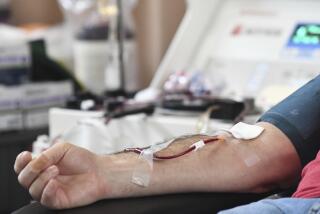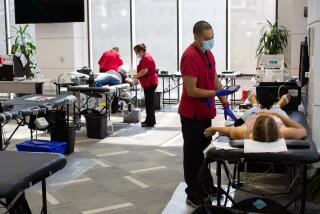New Guidelines likely on AIDS in Workplace
- Share via
WASHINGTON — The Department of Health and Human Services is expected to recommend today against routine blood screening for AIDS in the workplace and against restrictions on employees known to be ill with the disease or infected with the virus, Public Health Service officials said Wednesday.
The new national guidelines do not have the force of law but carry considerable weight within the public-health community. They will apply to workers in jobs where there is no known exposure to AIDS as well as to health-care professionals and personal-service workers, such as cosmetologists, who may come in contact with the disease in their jobs.
The recommendations, to be released by the department and the federal Centers for Disease Control, say that restrictive procedures are unnecessary because there is no medical evidence that AIDS is transmitted by the kind of casual contact that takes place in the majority of workplaces.
“AIDS is a blood-borne, sexually transmitted disease that is not spread by casual contact,” a draft of the guidelines said, adding that the Public Health Service does not recommend “routine antibody screening.”
The blood antibody test detects whether an individual has been exposed to the AIDS virus, known as HTLV-III, but does not mean that a person has or will develop the disease. It was introduced last spring to safeguard the nation’s blood supply.
In a controversial action last month, however, the Pentagon announced it will use the test to screen all military personnel for possible exposure to the virus.
The department intends to distribute the guidelines to all members of Congress, medical associations, insurance executives, business organizations, labor unions and community groups, such as the Chamber of Commerce. A cover letter sent by the department with the guidelines emphasizes that “this is not an easy disease to catch. It is not spread by casual contact.”
AIDS, or acquired immune deficiency syndrome, destroys the body’s immune system, leaving it powerless against otherwise rare infections. It is transmitted through sexual contact--with the exchange of bodily fluids such as semen and blood--and through the sharing of unsterilized hypodermic needles. It has also been spread through transfusions of contaminated blood or blood products, although the screening procedure begun last year has now made that risk slight.
Those at highest risk include male homosexuals and bisexuals, intravenous drug users and their steady sexual partners. As of Monday, there were 14,739 reported cases and 7,545 deaths.
The guidelines also urge that food-service workers known to be ill or infected with AIDS not be restricted from their jobs “because AIDS is not transmitted through preparation or serving of food and beverages.”
The recommendations also suggest that health-care workers take precautions in dealing with blood or bodily fluids from AIDS patients, and that health-care employees known to be infected with AIDS not be barred from their jobs, because there is “no evidence” the virus could spread to patients under most situations.
The guidelines warned, however, that there is a theoretical danger that AIDS could be transmitted through major “invasive procedures,” in which there could be an exchange of blood between the patient and the health-care professional, such as a surgeon or dentist. The guidelines said that more detailed recommendations for such practitioners are still in progress and will be issued later.
The guidelines also recommended against routine blood screening of all patients admitted to hospitals, saying such a procedure is unlikely to reduce the danger of AIDS transmission to health-care workers, which is already “extremely low.”
Only three health-care workers in the country are thought to have been infected with the AIDS virus during the course of their jobs. The guidelines suggest, however, that “some hospitals in certain geographic areas may deem it appropriate” to begin blood testing of patients, presumably those in areas with high rates of the disease, including San Francisco, Los Angeles and New York.
An earlier draft of the document also contained language “affirming the obligation of the employer to educate employees,” according to a source familiar with the draft.
“The document recommended that employers educate them not just about the spread of the disease, but against unwarranted fear,” he said.
The CDC has already issued guidelines recommending that most schoolchildren with AIDS be allowed to attend classes.
More to Read
Sign up for Essential California
The most important California stories and recommendations in your inbox every morning.
You may occasionally receive promotional content from the Los Angeles Times.













